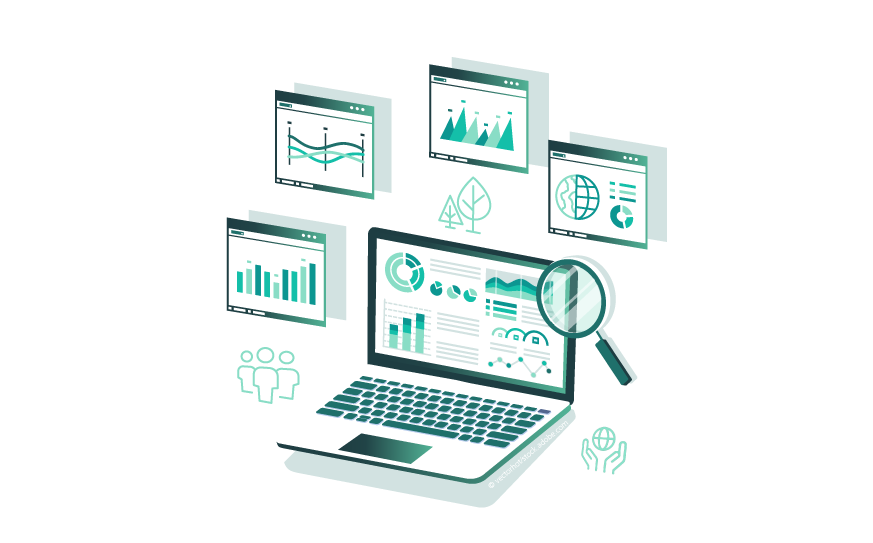“Sustain.AI” – The AI tool for analyzing sustainability reports
“Sustain.AI” – The AI tool for analyzing sustainability reports
Where does the AI application offer the greatest benefit?
Sustainability reports are an important part of a company’s information policy. They provide interested members of the public with information about the organization’s activities and performance regarding sustainable development. Since 2017, all listed companies with 500 or more employees have been required to publish such reports. In doing so, they follow the CSR (Corporate Social Responsibility) directive. The main aim of this directive is to increase transparency regarding the environmental and social aspects of companies in the EU. This includes information on environmental, social and employee issues as well as the protection of human rights and the fight against corruption.
Like annual reports, sustainability reports are also used as a basis for important purchasing or investment decisions. However, the necessary identification of all relevant criteria and information usually requires a great deal of time and effort. With the tightening of the CSR Directive implemented by the EU in 2023, which will extend reporting requirements to other aspects and a larger group of companies, this work becomes even more complex – especially if reports are evaluated manually.
The AI-based tool Sustain.AI makes this work easier. Thanks to machine text recognition, sustainability reports can now be analyzed in a highly efficient and structured way. The technology behind Sustain.AI is particularly aimed at auditors and controllers who can use the tool in their day-to-day work.
What are “Sustain.AI’s” quality features?
- Time saving: The KI.NRW demonstrator allows for quick and efficient handling of sustainability reports and analysis of the required CSR criteria. With the help of AI language models, the text passages relevant to the respective criteria are filtered out. In this way, auditors can focus on the sections that are most relevant to the respective criterion.
- Overview and context: With the integrated PDF viewer, the extracted text elements can be displayed in the report at any time. This allows users to immediately grasp the context of the passage.
- Integrated feedback and adaptability: Users can evaluate the system’s suggestions using the built-in feedback system. This helps us to further train the AI model and continuously improve its quality. It is also capable of learning new criteria.
“Sustainability is increasingly becoming the focus of public attention. With the AI-supported tool Sustain.AI, it is possible to efficiently analyze and browse sustainability reports.”
Which AI technology is used in the KI.NRW demonstrator?
Modern language models are neural networks which are trained to predict a word by the context in which it appears. In this way, they learn an accurate representation for all words in the text and is capable of semantically comparing and classifying text passages.
PDF is a widely used unstructured file format. This means that although headings and tables are visually recognizable to readers, there is no internal structure. To be able to work with PDFs automatically, intelligent image processing algorithms are required to extract this structure from the images and correctly classify objects such as tables and paragraphs.
What does the AI demonstrator show?

The AI-supported suggestion system is an intelligent, intuitive search engine. You can upload your own documents as well as view existing reports. The reports can be searched and analyzed using a stored checklist from the “Global Reporting Initiative”, a widely used reporting framework for sustainability reporting.
Request a non-binding consultation with our experts now!
Curious? Click here to go straight to the demonstrator!
Where can I find more information?
AI.map with entries around data analysis and forecasting
More AI providers, applications, and AI products “made in NRW” with the same AI focus can be found using the filter and search function of the AI.Map, which currently contains more than 1000 entries.
Study “Modern language technologies”
Find out where we encounter modern language technologies in everyday life and at work and what economic opportunities they offer.
Fraunhofer IAIS: Media Engineering
You can learn more about the topics of “Cognitive Business Optimization”, “Smart Coding and Learning”, and AI-based industrial image processing on the website of the IAIS Media Engineering department.
Contact the team of developers

Maren Pielka
Data Scientist and Team Leader Cognitive Text Analytics,
Business Area Cognitive Business Optimization,
Media Engineering Department
Fraunhofer IAIS
Schloss Birlinghoven
53757 Sankt Augustin
Phone +49 2241 14-2871

Lars Patrick Hillebrand
PhD Student / Research Assistant in Machine Learning,
Media Engineering Department
Fraunhofer IAIS
Schloss Birlinghoven
53757 Sankt Augustin
Phone +49 2241 14-1920
